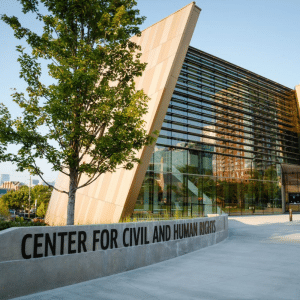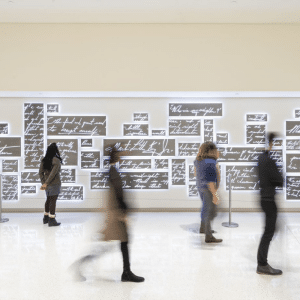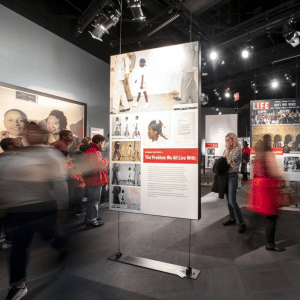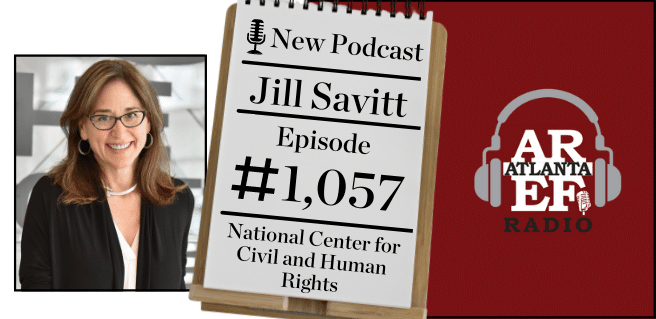Podcast: Play in new window | Download

Jill Savitt, CEO for the National Center of Civil and Human Rights, joins the Atlanta Real Estate Forum Radio podcast to discuss the center’s exhibits and the importance of advocating for civil and human rights. Savitt joins hosts Carol Morgan and Todd Schnick for the Around Atlanta segment.
Savitt, involved with the museum for the last 10 years, became the CEO of the center two years ago. Before there was a physical building to house the center, Savitt curated the human rights gallery, an exhibit on the top floor that showcases human rights around the globe.
“It’s such a delight to be able to come to Atlanta for this role. I love it. It’s a fantastic city,” said Savitt. “Our museum is really a backbone because [Atlanta] is the birthplace of civil rights and the hometown of Dr. King. We bring all of that storytelling to life in our museum.”
The center is both a museum and a civil rights institution that centers around three stories. The first is the story of the U.S. civil rights movement titled “Rolls Down Like Water,” highlighting the narratives of those that many know as well as unknown heroes.
“Spark of Conviction,” the human rights gallery, links the civil rights movements of the fifties and sixties to the nonviolent human rights movements throughout the world in an immersive and dynamic experience. From large-scale world events such as the fall of the Berlin Wall to Tiananmen Square, the exhibit introduces viewers to the world’s human rights defenders taking up the cause of human dignity within their own societies.
Through several dynamic installations, the experience defines human rights, its origins and how they are enforced. There are also exhibits that focus on the greatest champions of human rights as well as some of the biggest perpetrators of human rights abuse, many of whom got away with their crimes.
 The museum’s third permanent exhibit centers around the papers and artifacts of Dr. Martin Luther King Jr. Named “Voice to the Voiceless,” the gallery is a sacred place to many and offers non-scholars a space to see the papers, handwriting and personal effects of Dr. King. The papers are rotated and showcased based on a particular theme and the current one, “Beloved Community,” allows visitors to see the famed leader’s papers discussing the importance of community.
The museum’s third permanent exhibit centers around the papers and artifacts of Dr. Martin Luther King Jr. Named “Voice to the Voiceless,” the gallery is a sacred place to many and offers non-scholars a space to see the papers, handwriting and personal effects of Dr. King. The papers are rotated and showcased based on a particular theme and the current one, “Beloved Community,” allows visitors to see the famed leader’s papers discussing the importance of community.
Outside of the facility, the center hosts programs for schools K-12 to teach human rights history as well as a program for law enforcement that focuses on the history of human rights, law enforcement’s role in history and its responsibility to keep democratic societies healthy.
There is also a Diversity, Equity and Inclusion Training Program offered to workforces looking to become more inclusive. There are also smaller programs that focus on LGBTQ+ rights and human trafficking.
Savitt said, “Our overarching concern, our mantra, is to help people tap their own power to protect their rights and the world around them.”
Equal Dignity at Work consists of seven different modules designed for workplaces to breach crucial topics, including workplace bias, industry trends, diversity and inclusion. The brave conversations allow participants to recognize prejudices and discuss them. The programs do not touch on recruitment, pipelining or nurturing talent but focus on connecting history to the present moment and breaking down barriers.
In the United States, the current political atmosphere makes it hard for many to discuss opposing views without leading to a larger argument. These brave conversations promote grace and acknowledge that while people may say unintentionally hurtful things, educating participants on rephrasing questions to keep topics open and calm is beneficial for exposing others to opposing arguments and educating in a healthy and respectful manner.
“Workplaces are some of the most integrated places we have and are the perfect places to practice pluralism. It’s the place to talk to people who are different than you,” said Savitt.
Each module is one hour long and can be hosted at the center, a workplace or over Zoom. The center has trained 900 employees from 20 different companies, many of whom are repeat customers since its establishment. Visit the center’s website to fill out the form and the center will set up a discovery conversation to determine what topics to cover.
The organization focuses on giving visitors and program participants the tools and techniques to educate themselves further to become more involved in their community as well as human and civil rights.
The substantial human rights challenge our society faces currently is the strength and health of democracy. Every right that one could ever expect or want to have is protected and conditioned on living in a healthy democracy. Civil and political rights, such as having unfettered access to voting, free speech, the privilege to dissent and freely associate depend on the organization’s health. Other freedoms include access to good education and a standard of living that allows one to obtain a better life.
“If you can’t eat and you’re hungry, and you can’t get a job that gets you out of poverty, you can’t enjoy basic human dignity,” said Savitt. “[This is] what human rights protect.”
Savitt went on to explain that any additional problems societies face, such as climate change and polarization, arise from a lack of respect for pluralism. Pluralism allows people to make decisions as a part of self-governing, which is the big experiment in the United States. If there isn’t a way for systems to work together to solve critical challenges, then every other right is threatened. The sanctity of rights is a question mark for many people due to intolerances and polarization paralyzing decision-making processes.
The United States, founded on “We the People,” has an enormous opportunity for people to come together and exert pressure on those in power to sway them to particular viewpoints. The National Center for Civil and Human Rights focuses heavily on these necessary rights.
 The civil rights movement was one of the most transformational human rights campaigns in history after individuals saw injustice, rallied together and did not stop until they secured a Civil Rights Act in 1964 and in 1965, the Voting Rights Act. Those two fundamental pieces of legislation highlight the story of how civil society can come together to make progress in the United States.
The civil rights movement was one of the most transformational human rights campaigns in history after individuals saw injustice, rallied together and did not stop until they secured a Civil Rights Act in 1964 and in 1965, the Voting Rights Act. Those two fundamental pieces of legislation highlight the story of how civil society can come together to make progress in the United States.
The official civil rights movement comes out of the aftermath of World War II, the Holocaust and the deprivation of people in the rise of fascism. Implemented in 1948, the United Nations was born out of these atrocities to act as a human rights regime. The institution drafted the Universal Declaration of Human Rights, a document roughly outlining 30 essential human rights.
The document showcased the differences between western democratic countries and largely socialist countries. Democratic societies value civil and political rights such as voting, assembly, speech and political participation while socialist societies value the right to healthcare, work, education, a clean environment, cultural, economic and social rights.
In the United States, citizens use political and civil rights to elect officials that share the same ideas on important topics such as healthcare and education. Human rights are one of the main topics of discussion, and whether access to these things is a necessary right that will lead to a life of dignity. For example, during the pandemic, the health of the population determined individual health risks and similarly, if there is a lack of good education, there will be a lack of an educated workforce.
The civil rights exhibit, designed by a theater director, allows visitors to uniquely experience exhibits in a play-like format through music and virtual experiences, such as the popular lunch counter sit-in audio simulation. The exposition focuses heavily on the young foot soldiers of the movement from around the country hosed by police and beaten as they registered voters and emigrated through rest stops during the Freedom Rides.
Savitt shared, “We tell a really powerful, immersive story.”
The current temporary exhibit focuses on the Rosenwald Schools, schools born out of a unique partnership between James Rosenwald, owner of the Macy’s department store, and Booker T. Washington, a civil rights leader. The two combined forces during segregation to create schools for black students. Prominent civil rights leaders such as John Lewis and Maya Angelou attended a Rosenwald School. The exhibit showcases the work of a photographer who traveled 20,000 miles around the south to take photos of Rosenwald Schools and chronicle the efforts of many communities to landmark and preserve them.
“These schools are hugely important in terms of the people who joined the human rights movement and artists, professionals and teachers from the black community who ascended to positions of leadership and influence,” said Savitt. “They are very important, but they are not well-known.”
The exhibit titled “Better Life for Their Children” is available to view through December of this year.
There is a misconception that to join the civil and human rights movement, one needs to aspire to be like Dr. King, a once-in-a-generation voice, talent and brain. The center emphasizes the stories of those who built the Rosenwald Schools, organized the March on Washington and refused to give up their seat before Rosa Parks to explore the stories of ordinary people who managed to do extraordinary things.
The global exhibit expands to international stories of people many may not know but whose actions held purpose. From a nun standing up to drug cartels to an advocate in Russia opposing anti-gay legislation, visitors can explore stories outside their home country.
The National Center for Civil and Human Rights is open four days a week, and tickets are available for purchase at www.civilandhumanrights.org. To support the center further, donate online or leave a review on Trip Advisor. The center also hosts programs online twice a month, covering a range of current human rights topics and featuring today’s human rights advocates.
Never miss an episode of Atlanta Real Estate Forum Radio! Subscribe to the podcast here. You can also get a recap of any past episode on the Radio page. Listen to the full interview above!
Georgia Residential Mortgage Licensee, License #22564. NMLS ID #6606. Subject to borrower and property qualifications. Not all applicants will qualify. The National Center for Civil and Human Rights and New American Funding are not associated. Click here to view the terms and conditions of products mentioned during the show. Corporate office 14511 Myford Rd., Suite 100, Tustin, CA 92780. Phone: (800) 450-2010. (October/2021)
New American Funding is a family-owned mortgage lender with a servicing portfolio of over 123,000 loans for $30.4 billion, 198 branches, and about 3,100 employees. The company offers several niche loan products and has made Inc. 5000’s list of Fastest-Growing Companies in America six times. It has a state-of-the-art career training facility and develops innovative technology, including the GoGo LO mobile application. For more information, visit www.branch.newamericanfunding.com/Atlanta.
![]()
The Atlanta Real Estate Forum Radio “All About Real Estate” segment, presented by Denim Marketing, highlights the movers and shakers in the Atlanta real estate industry – the home builders, developers, Realtors and suppliers working to provide the American dream for Atlantans. For more information on how you can be featured as a guest, contact Denim Marketing at 770-383-3360 or fill out the Atlanta Real Estate Forum contact form. Subscribe to the Atlanta Real Estate Forum Radio podcast on iTunes, and if you like this week’s show, be sure to rate it.
![]()
